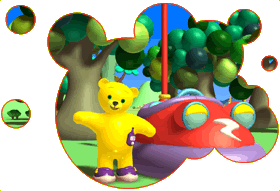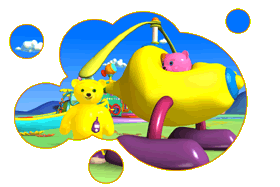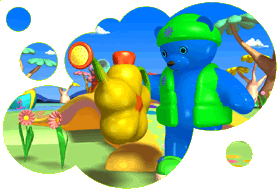
Lock up your children and set the V-Chip to stun. In the wake of the Teletubbies, a new pernicious plague of toddler terrors is set to take over the airwaves. This fall, rival British TV companies are going head-to-head in a battle for the hearts and minds of Britain's teenies (and the pocketbooks and credit cards of their parents) with two competing children's TV shows.
First out of the gate is GMTV's Jellikins, a computer-animated Saturday morning show aimed at two- to five-year-olds. The glutinous, psychedelic cast features jelly teddies -- Strum, Bouncey, Amber, Coral, Denny, and Pepper -- and their jolly dragon friend, Duffy. They look like Day-Glo replicas of the Stay-Puff Marshmallow Man, with the same smile of benevolent malevolence.
'Jelly Telly' is touted as "the next generation of educationally entertaining children's television," but even with narration by Rik Mayall(Drop Dead Fred, The Young Ones), the Jellikins storylines are so inane you can feel your braincells melting. Mayall was in a coma himself for part of last year, having suffered a serious head injury when he overturned his quad-bike. He now describes some of the characters' exploits in their Jelly World as 'a safe violence': "There's a whole world where these people can fall out of trees and not even hurt themselves," he marvels.

A flustered spokesperson for the Jellikins creators refused to contribute to this piece, claiming its appearance on GettingIt would compromise the show's pre-school credibility. But it faces a more serious threat. The BBC has a new production specifically designed to capitalize on the spillover audience from Teletubbies. Supposedly supporting "all aspects of a pre-school child's learning and development," it's called Tweenies.
Imagine four Mr. Potato Head's with Down's syndrome wearing lurid, fuzzy felt pajamas and you might get some idea of what the Tweenies -- Jake, Fizz, Milo, and Bella -- look like. The man responsible for breathing life into these walking, talking monstrosities is Neil Scanlon, the animatronics expert who birthed Babe. Each latex foam- and fabric-crafted Tweenie is inhabited by an actor and topped with a state-of-the-art remote-controlled, carbon-fiber head capable of producing 20 different facial expressions.
The BBC's new pre-school projectile in the post-Tubby war is already battling allegations of crass commercialism and stereotyping. Bella, the bossy girl Tweenie, is a dyke-ish tom-boy who likes dressing-up; the more feminine Fizz has a fetish for all things pink, the Mohawk-sporting Jake likes wrecking things, and the dreadlocked Milo is a Jar Jar Binks waiting to happen. Countering accusations of stereotyping, series commissioner Roy Thompson declaimed, "Milo isn't black, he's purple." Right, and Barney's purple but he's not a child molester.

The £5 million budget for the 260-episode show was raised by the combined might of BBC Education and BBC Worldwide. Oddly, BBC Education is the mercilessly commercial wing of Britain's public service TV network. This year, they are expecting to reap the benefits from $1.2 billion in projected U.S. sales of their Teletubbies merchandise. With Tweenies dolls and merchandise set to hit the shops in time for the holiday season buying bonanza, the Grinch-like corporation is obviously keen to steal Christmas from under the noses of their competitors. Ironically, 'tweenies' is also marketing slang for the phenomenon of teenagers who are hooked on designer brands.
Unfortunately, this post-Tubby onslaught arrives amidst a flurry of controversy about whether kids should ever be allowed to watch TV. A recent policy statement from the American Pediatrics Association frowns upon the use of electronic babysitters, and advises that parents keep children under two years old away from the TV set altogether. Moreover, a recent study carried out at Trinity College, Carmarthen claims nine- and ten-year-olds who watch more than four hours of TV a day displayed neurotic and psychopathic traits, and were more likely to hold racist attitudes and believe in the devil.
All of which must mean that Jerry Falwell was right to damn Tinky Winky as the spawn of Satan. Or then again, maybe he simply watched too much TV as a kid.
It's only a rumor that Chris Campion has a latex face. In fact, he only has one expression.
